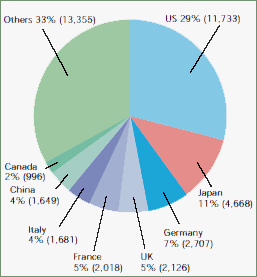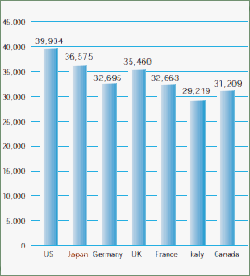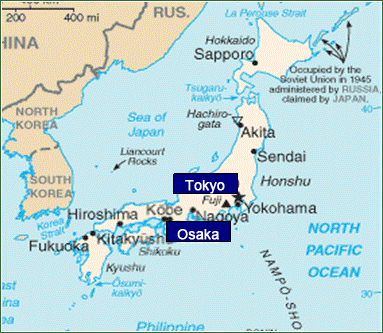 |
|
 |
 |
| Japan |
 |
 |
 |
Japan is back as a growth economy
A combination of positive cyclical forces and structural changes suggests that an upgrade to the short- and medium- term outlook for the country is in order. Over the next five to 10 years, the Japanese economy's growth potential is poised to be close to 2.5% -- much higher than the 1% to 1.5% estimates commonly proffered by economists. This paves the way for the Japanese economy to become an even more powerful engine of prosperity for Asia.
Several factors underlie this newfound optimism. The country's private sector no longer faces an overhang -- Japan has successfully worked off its post-bubble legacy of excess debt, excess capacity and excess employment. On the supply side, there has been an unprecedented reduction in unit labor costs -- the rise in corporate Japan's profitability and global competitiveness has only just begun.
One of the world's top markets: Japan is a promising market, with a market scale ranking among the top in the developed nations. |
| |
| GDP by country (%, US$ billion, 2004) |
Per-capita GDP in G7 countries (US$, 2004) |
 |
 |
| Source: "World Economic Outlook 2005," IMF |
|
|
| |
| Essentially, the following forces are at work: |
-
Reduced cross shareholdings. Corporate Japan's move away from the old cross-shareholding system has forced unprecedented changes in governance. The country is shifting from "insider capitalism" to "outsider capitalism." So-called "stable shareholdings" have dropped to around 22% of market capitalization from a peak of 53% in 1987. With a narrower definition of cross shareholdings, the corresponding drop is to about 15% from 38%
-
More competitive resource allocation. Reduced stable shareholdings and an increased free float effectively raise the cost of capital. This is because free-float investors are much more concerned about quarterly/semiannual corporate performance than stable cross shareholders. Japan's average price-earnings ratio has come down, so the cost of equity capital has gone up. Specifically, the equity-earnings yield is now around 6%, against a historic average of barely 2%.
|
|
|
| |
- Increased profits. Over the past decade, the increase in competition forced by
the unwinding of cross shareholdings may have had some demand-deflationary effect. This is because inefficient producers and suppliers were forced into bankruptcy. However, in the last couple of years positive demand-pull factors have definitely taken over. Bankruptcies have fallen consistently since the end of 2002, while corporate profitability has surged to new historical highs: operating profits for listed companies now stand more than 40% above the bubble-economy high of 1990.
-
Improved balance sheets. Structural change in corporate balance sheets has also progressed. The debt overhang has been paid off. For the first time in over a decade, corporate managers are free to use their cash flow to reinvest in the business, rather
than just pay back their bankers. As the chart nearby shows, the Bank of Japan flow-of-funds data confirms that total corporate sector interest-bearing liabilities have been cut by about 200 trillion yen ($1.7 trillion) since 1996. As a result, the gearing of the corporate sector has dropped to below 80% of GDP, from a peak of around 125% of GDP in 1996. Japan's corporate balance sheets are in their best shape since the early 1970s, a fact reflected by credit-rating agencies issuing a steady stream of corporate credit upgrades in recent months.
Siegle, Hu & Partners helps to capitalize on these growth opportunities and to understand the complex business environment. We have been active in Japan since the 1990s and has offices in Tokyo and Osaka. Our consultants have worked with clients from around the world seeking to penetrate in the Japanese market.
Siegle, Hu & Partners – Japan Offices |
| |
 |
| |
Siegle, Hu & Partners helps foreign companies enter or develop the Japanese market
Our advisory provides cross-boarder advice and assistance based on our deep financial, analytical and business process skills to international corporations in the implementation of their Japan strategy, relating to: |
- Creating / acquiring / financing businesses
- Strategic advisory
- Mergers & acquisitions
- Integrating acquired entities into the current network of operations
- Enhancing performance of Japan subsidiary
- Restructuring and realizing value
|
We do this in a manner that helps our clients create stakeholder value, build trust and communicate with the marketplace. Japanese companies operating in overseas markets face various challenges. Achieving success means managing communications effectively across diverse cultures, languages, and geographic boundaries. Our Japanese Services Group addresses these important issues with a global perspective that has been accumulated from years of experience. To meet Japanese multinational company needs we combine our extensive experience and knowledge about client service together with a careful consideration for Japanese culture and customs. |
| |
 TOP TOP |
 |
|

